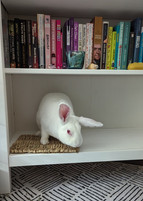It's with a heavy heart we report the loss of one of our foster rabbits - Beignet. Early this June, she was rushed into surgery with a suspected case of liver torsion, a condition that was later confirmed by the veterinary team. Despite medical intervention and efforts made to save her, her condition was too severe. It was too late.

Beignet had a rough start. She was found scavenging in the streets of Baltimore. When HRS brought her in, she had severe ear infections, eye inflammation, plus mites. She was nervous, but regained her health in both body and spirit with the love and care of her foster parents. We want to extend our thanks to every foster parent who provided this quirky and curious girl with a safe space so that she could know how it felt to be loved.
If you would like to make a contribution in Beignet's name, please do so through our website. Your contributions will help cover her after-life care and future medical bills for afflicted rabbits. Thank you for enabling us to provide our foster rabbits with the best care possible.
If you've cared for Beignet, feel free to leave some words in the comments.
Liver Lobe Torsion

While not as common as gastrointestinal stasis, liver lobe torsion (LLT) is a serious medical condition that can prove fatal to rabbits. It's an odd occurrence that's becoming more readily diagnosed with medical advances. A rabbit’s liver consists of five lobes; liver torsion occurs when one of these lobes (usually the caudate lobe) twists on itself, causing the veins to collapse while the arteries remain open. This means that blood can flow into the lobe but not out of it. As a result, the liver can become distended and bleed into the abdomen. Toxins and waste may also build up in the twisted lobe.
Symptoms of LLT resemble those of GI stasis: decreased appetite, lethargy, reduced fecal output, and abdominal pain. Other symptoms may include jaundice and anemia. If your rabbit displays any of these symptoms, prompt medical attention is necessary to improve chances of survival.
LLT is diagnosed with bloodwork and advanced imaging, such as ultrasound or CT scan. Treatment often involves surgical removal of the affected lobe, along with supportive care in the form of subcutaneous fluids and pain medication.
LLT has been observed to affect lop rabbits in particular, although any breed of rabbit may develop the condition. Whatever breed you have, owners must be vigilant in recognizing changes in their rabbit's behavior and have an experienced veterinarian on call to take timely action.
Sources:
Abigail Edis. (2021). Clinical presentation and management of liver lobe torsions in domestic rabbits.
Dr. Jennifer Graham, DVM, ABVP, ACZM. (2024). The Rabbit Liver in Health and Disease.
Dr. Kanfer. (2022). Kanfer’s Answers: Liver Lobe Torsion.
Mme. Matilda Munyon. (2021). A Twisted Tale: Liver Lobe Torsion in Rabbits.
Brendan Noonan, DVM, DABVP. (2022). Identification and Management of Liver Lobe Torsion in Domestic Rabbits.
Wabbit Wiki. (2024). Liver Lobe Torsion.
















Yorumlar